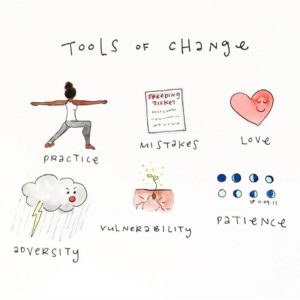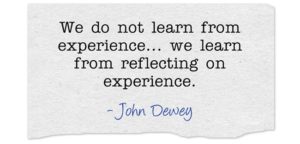29 November 2017

I have been struggling to focus since the summer. And as I have been working hard to reboot my life, I saw an image (at the left) that resonated with me. I saw this early in November, which is the time of the year where #acwrimo** happens.
Between the accountability of academic writing month and this image, I took the time to reflect on how to re-shape my work life. In many ways, November and academic writing month has been a success for me.
Please know when I say success that I recognize that success looks and feels and is different for each of us, and also know that I am not advocating for the overproduction that plagues higher education. But what I am saying is that we do need to think carefully and strategically about how our work lives and reflect on ways to make that happen.
So over the course of November, I’ve been more deliberate in my work schedule, and I have taken to heart these tools for change. Here is how they played out for me.
Practice
I had gotten out of the practice of writing (and the related tasks that fit with writing and count as “writing”). So without doubt, everyday I did something that was attached to a project. From reading, to editing, to drafting words, to coding data, to gathering data, to analysis…..you get the idea. I worked hard at re-learning—at practicing—the art of writing and research. And I hope this practice stays with me into the spring as I head back to the classroom!
Mistakes
This month (as well as the ones before and no doubt after) I made a ton of mistakes. All sorts of mistakes. From forgetting things, from not responding as soon as I should, from drawing incorrect conclusions, from collating data incorrectly and having to re-do thousands of entries, from “that’s a great section” to understanding it had to be deleted….you get the idea. Having the courage to admit that mistakes are part of our lives (and often our daily lives) is a free moment. It opens up space to laugh at yourself, admit it, and then find ways to move forward. My mistakes this past month have helped me realize it’s all going to be ok.
Love
I was reminded of the joys of life through this month as friends and colleagues near and far took time to read or comment or just talk to me to work through a problem. There is a love in this sort of giving and receiving, and often, we forget to acknowledge how important this sort of help and support is not only to the work but to ourselves and well-being. Feeling the love and support of others—which in part can’t be accomplished unless you ask for help—offsets the day to day grind.
Adversity
Life is filled with adversities. And it’s no secret that this job can be challenging. As I approached trying to re-learn how to do this job, there were new challenges and difficulties that I had not face before. I learned new strategies for focusing; new strategies for revising; new strategies for reading. You name it and I worked toward a new practice or an improved old practice to get anything accomplished. The constant feeling of walking uphill (not quite like Atlas but close) reminded me that adversity brings with it its own rewards. Just the simple fact that I kept trying and found some success made it all worthwhile.
Vulnerability
Writing and research and teaching are all vulnerable moments (whether we acknowledge it out loud or not) because they open us up for being judged. For most of this month, I have walked around feeling like I was partially flayed open and it was disconcerting and at times, disheartening. But part of the success of this month was found in the fact I pushed on through. I reminded myself that I as definitely not alone in the feeling of vulnerability. (see above about love and friendship.)
Patience
My entire life I have wished I was more like my mother. The reasons for that are legion, but one that I often refer to is the fact my mother is a model of patience. Working this past month has been a testament in patience. I have had to consciously be patient with myself and refuse the impulse to be too hard on myself when things didn’t go right or it was taking too long to do things.
 But patience circles us back to practice. We have to be patient and kind to ourselves as we practice new things because we will make mistakes and face adversity and feel vulnerable, but hopefully, through it all we can find and share the love with one another.
But patience circles us back to practice. We have to be patient and kind to ourselves as we practice new things because we will make mistakes and face adversity and feel vulnerable, but hopefully, through it all we can find and share the love with one another.
As we all finish up this term and start to contemplate what we’ll do over the “break,” I encourage you to think through what your tools for change may be. The opening image spoke to me and helped me reflect on this month where I was consciously and deliberately trying to invoke a change in my own work life. It is important to our own professional development to give ourselves the space to reflect on our own practices. What would be your tools for change?
Wishing you health, joy, and peace in your own reflection processes.
** acwrimo = academic writing month which occurs in November. It’s the academic equivalent to the creative writing month to write your novel. Its aims are to provide a source of accountability and focus to get writing projects moving forward.

